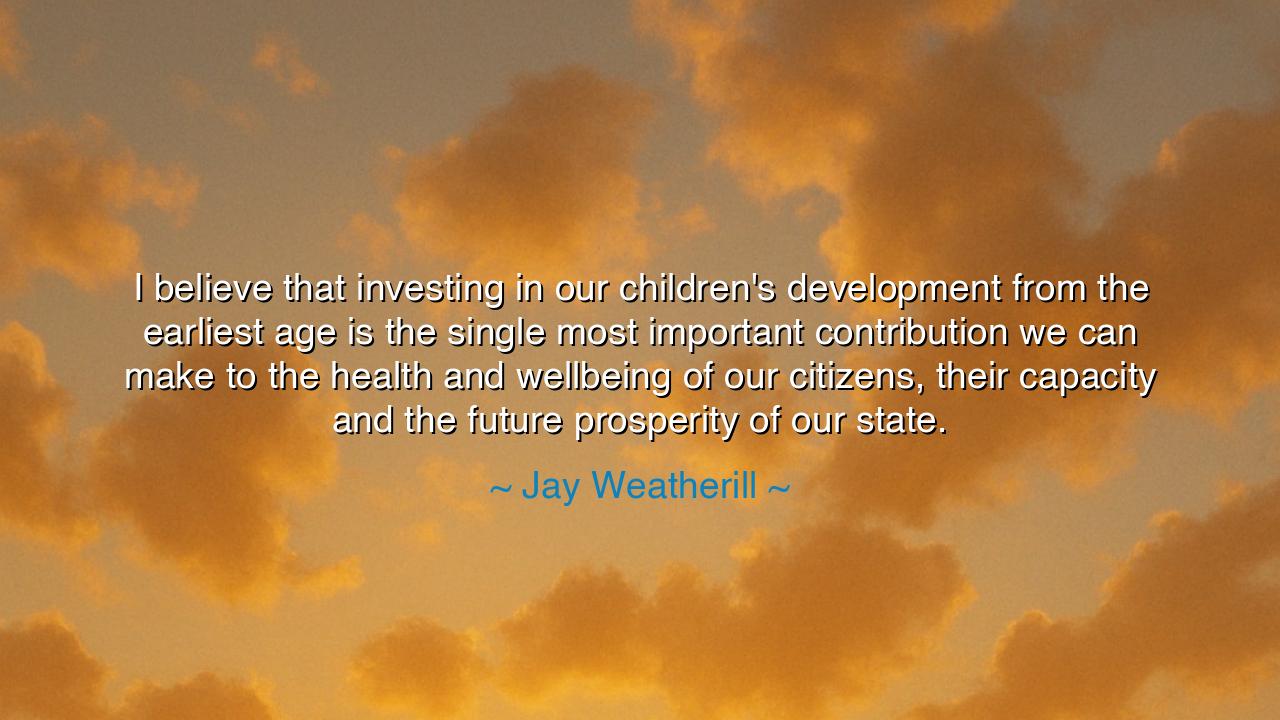
I believe that investing in our children's development from the
I believe that investing in our children's development from the earliest age is the single most important contribution we can make to the health and wellbeing of our citizens, their capacity and the future prosperity of our state.






“I believe that investing in our children's development from the earliest age is the single most important contribution we can make to the health and wellbeing of our citizens, their capacity and the future prosperity of our state.” — Jay Weatherill
Hear now, O stewards of the future, the wise words of Jay Weatherill, a leader who saw beyond the horizon of his own time, who understood that the destiny of a nation is not forged in the chambers of power, but in the minds and hearts of its children. In this saying, he reveals a truth as ancient as civilization itself — that the foundation of a strong and prosperous society begins not with monuments or armies, but with the nurturing of the young. He speaks of investment, not in gold or trade, but in the sacred work of cultivating human potential. For what treasure can compare to a generation raised in health, wisdom, and compassion? What wealth is greater than the thriving of one’s own people?
The origin of this wisdom lies in Weatherill’s years as the Premier of South Australia, where he championed the cause of early childhood development, understanding that the first years of life shape the architecture of the brain, the habits of the heart, and the resilience of the spirit. His vision was not merely political, but deeply human: that by caring for children in their earliest days — through education, nutrition, safety, and love — a society ensures its own longevity. He saw that the health and wellbeing of citizens begins not in hospitals, but in homes; not with medicine, but with nurture; not with reaction, but with foresight. His words are the voice of stewardship — a reminder that the present must plant seeds for the future it hopes to reap.
This truth is echoed across the annals of history. The ancient Greeks taught that the education of children was the duty of the state, for they knew that the minds molded in youth would one day shape the fate of the polis. The Romans, in their wisdom, trained their young not only in letters and arms but in virtue — for they believed that character was the bedrock of empire. In Confucian China, the family and the village shared responsibility for a child’s upbringing, knowing that harmony within the household created harmony within the nation. Weatherill’s words, though spoken in the modern tongue, carry this same eternal flame — that the prosperity of the state is born from the flourishing of the child.
Consider the story of Maria Montessori, the Italian physician who, through her work with children of poverty, discovered that early education could awaken extraordinary potential. She found that when children are respected, given space to explore, and guided with patience rather than punishment, they grow not only in intelligence but in confidence and empathy. Her method spread across the world, transforming classrooms into sanctuaries of self-discovery. Through her example, we see that to invest in children is to invest in peace itself — for every child nurtured becomes a pillar against ignorance, violence, and despair.
Weatherill’s statement also carries a moral challenge. He warns, silently but surely, that neglecting the early years is the root of future suffering. A society that abandons its children to poverty, hunger, or neglect sows the seeds of its own decline. Crime, illness, and division are but the shadows cast by the failure to care for the young. Thus, when he speaks of the future prosperity of the state, he does not speak merely of economic growth, but of the wholeness of the human spirit. For no nation can stand tall upon the broken dreams of its children; no government can endure whose people grow up unprepared to love, to think, and to hope.
In this light, the quote becomes both prophecy and commandment. It calls upon parents to teach with patience, upon teachers to inspire with passion, and upon leaders to govern with compassion. It reminds us that health and wellbeing are not born of luxury, but of love; not of privilege, but of purpose. The measure of a civilization is not in the wealth of its elders, but in the joy and safety of its youth. Those who invest in the young build a bridge to immortality, for their legacy lives on in the laughter, strength, and wisdom of generations yet unborn.
Therefore, O listener, take this teaching to heart: care for the children — not as burdens, but as blessings; not as dependents, but as the architects of the world to come. Nurture their bodies with health, their minds with knowledge, and their spirits with kindness. Support the schools that teach them, the families that shelter them, and the communities that guide them. For as Jay Weatherill reminds us, this is the highest form of investment — one that yields returns not in currency, but in human flourishing. To build the future, one must first build the child; and to heal the world, one must first protect its smallest hearts.






AAdministratorAdministrator
Welcome, honored guests. Please leave a comment, we will respond soon